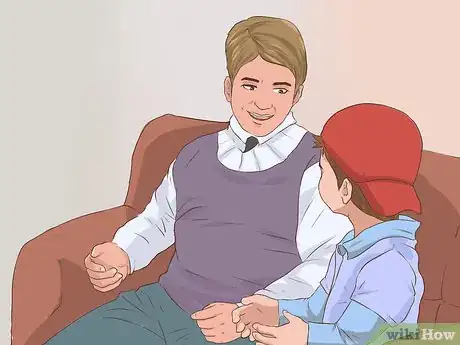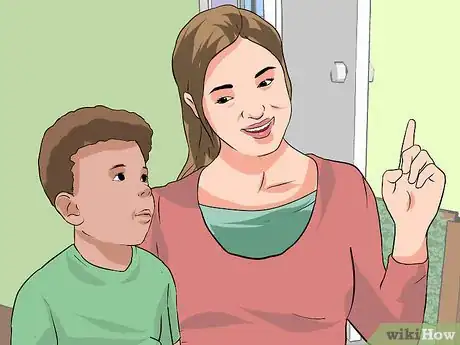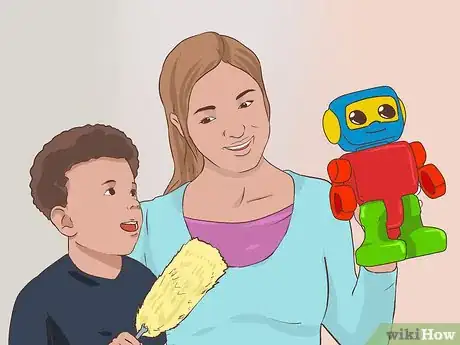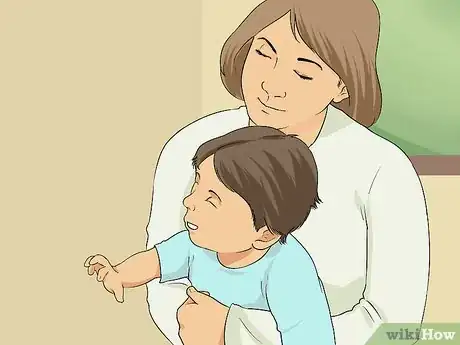This article was co-authored by Klare Heston, LCSW. Klare Heston is a Licensed Independent Clinical Social Worker based in Cleveland, Ohio. With experience in academic counseling and clinical supervision, Klare received her Master of Social Work from the Virginia Commonwealth University in 1983. She also holds a 2-Year Post-Graduate Certificate from the Gestalt Institute of Cleveland, as well as certification in Family Therapy, Supervision, Mediation, and Trauma Recovery and Treatment (EMDR).
There are 7 references cited in this article, which can be found at the bottom of the page.
This article has been viewed 189,242 times.
Step-families are complicated, and being a stepmother comes with special challenges. Stepmothers tend to be more involved in running the household than stepfathers, and often feel more pressure to create one big, happy family. While there is no magic solution for creating the perfect stepfamily, stepmothers can help foster a supportive, healthy family environment by practicing open communication and spending quality time with their stepchildren.
Steps
Communicating With Your Stepchildren
-
1Give your stepchildren time. Women are more likely than men to feel responsible for making their stepfamilies perfect. However, remember that most stepchildren will need time to adjust. Some may be open from the start, while others may be more reluctant to engage.[1]
- Recognize that the transition is hard for them. Be patient. It may take two years or longer for some children to feel comfortable.[2]
- Shy children and older children, especially teens, may take longer to open up to you.
-
2Do not expect to occupy the role of mother. While your role may evolve into a “motherly” one as time goes on, do not expect this from the start. Sometimes, stepparents take on more of a mentorship role, particularly for teens.[3]
- What matters is that the relationship is healthy and satisfying for stepparent and stepchild.
Advertisement -
3Set some boundaries. Children need rules. While you might be tempted to forgo all rules in attempt to win over your stepchildren, this will only create more problems. Be firm, but kind, sort of like a camp counselor. You shouldn't be the primary disciplinarian, which could strain an already sensitive relationship. Let your partner take on that role.[4]
- Say something like, “In our house, we don't do that.”
- Speak calmly and avoid screaming.
-
4Create a judgement-free environment. Let your stepchildren know that they can communicate honestly and openly with you without fear of judgement. This will help strengthen your relationship.[5]
- Say something like, “I care about you, and I want you to tell me how you feel.”
- Set an example by communicating openly as well. You might say, “When you don't listen to me, it makes me feel like you don't value my opinion, and that hurts.”
-
5Stick to your word. Divorce can make children wary of trusting the adults in their lives. Your stepchildren will need to feel safe and secure. Keep your promises and always be supportive. [6]
-
6Don't take things too personally. Your stepchildren will likely have a hard time adjusting, and their loyalties may be divided. While you shouldn't put up with rudeness, don't expect gratitude or affection right away. All that may come later. In the meantime, continue doing your best and try to be patient.[7]
Bonding with Your Stepchildren
-
1Spend time alone with your stepchildren. Get to know your stepchildren by spending one-on-one time with each child. Ask them about their day, their interests, or their hobbies. Show you value them and their ideas by listening attentively.[8]
- If you live with your stepchildren, try to find some one-on-one time every day. You might want to start a project together, like a rock collection or a craft.
- If you do not live with your stepchildren, try playing online games together, or taking them to their favorite store or restaurant.
-
2Respect family traditions while creating new ones. Family traditions are important, and you should respect those that were in place before your arrival. However, you shouldn't be afraid to create new ones. Family routines and rituals can be effective tools for bonding. Create at least one new family ritual. Choose something everyone in the family can enjoy.[9]
- You might plan a weekly trip to the beach, a game night, or bi-weekly family dinners.
-
3Attend your stepchildren's events or activities. Maybe one stepchild has a soccer game, and another is starring in the school play. Attend these activities with enthusiasm—it will show you care.[10]
-
4Don't play favorites. If you have biological children, be certain not to show favoritism. Do your best to show that you value each child, biological or step.[11]
- At the same time, beware of overcompensating by showing more affection to your stepchildren than to your biological children. Try to spend one-on-one time with your biological children each day.
Communicating With Your Partner and Their Ex
-
1Define your role. Talk to your partner so you can come to a clear understanding of your role in the family. Talk about what you expect from each other in terms of your own marriage and your relationships with the children.[12]
- Ask about any boundaries your partner's ex wants you to maintain with the children. This is especially important for stepmothers, who are generally more involved in childcare than stepfathers.[13] Respecting boundaries will create a happier, more functional household.
- For example, if the biological mother always makes the Halloween costumes, you should respect that.
-
2Make sure your partner is involved in disciplining the kids. Your partner may feel guilty about the divorce, and ease up on disciplining the children as a result. However, acting as the sole disciplinarian can cause the children to resent you. Make sure you take turns enforcing the rules.[14]
- You might tell your partner, “I need you to help me out with disciplining the kids. It's hard for me to work on bonding with them when I'm the only one enforcing the rules.”
- Make a concrete plan with your partner. Say, “Today, I'll tell the kids to make their beds. Next time they forget, it's your turn.”
-
3Never speak badly about your partner's ex. Avoid saying negative things about your partner's ex, and make sure your partner does the same. Continued fighting after a divorce can hurt the children.[15]
-
4Establish a good relationship with your partner's ex, if possible. Stepchildren are often resistant to developing a relationship with their stepmothers because they don't want to be disloyal. Your stepchild might view their resistance as an act of solidarity with your partner's ex. Establishing a cordial relationship with your partner's ex can remove this barrier, allowing you to connect better with your stepchildren.[16]
- Call your partner's ex and try to set up a time to meet.
- Be open to what your partner's ex has to say, and try not to get defensive.
Taking Care of Yourself
-
1Take time to recharge. Making a stepfamily work can be an extremely challenging process. You won't be able to help the family to the best of your ability if you are exhausted and depleted. Set aside a little time for yourself each day, and reach out to friends for support if you need it.
-
2Nurture your relationship with your partner. While you may find yourself putting nearly all your energy into building a relationship with your stepchildren, it is important that you don't neglect your marriage. After all, you and your partner should model a healthy relationship for the children. When your relationship is strong, everyone benefits.[17]
- Set aside time during the week to go to dinner, lunch, or coffee without the children.
- Avoid arguing in front of the children. Make sure your are on the same page and present a unified front.
-
3Talk to a therapist if you need to. Step families are complicated, and you shouldn't blame yourself for familial hardships. If you feel your relationship with your stepchildren is especially strained, consider trying family therapy.[18]
- Also, consider attending a few preventative family therapy sessions when your step family is first formed, even if you don't have many issues at first. This can prevent problems down the road.
Expert Q&A
Did you know you can get expert answers for this article?
Unlock expert answers by supporting wikiHow
-
QuestionMy mom died when I was 8 and my dad remarried. I love my step mom, and I don't want to call her "step mom" because she means more to me, but I don't want to call her mom, either. What should I call her, and how should I bring up the conversation without making it too dramatic?
 Klare Heston, LCSWKlare Heston is a Licensed Independent Clinical Social Worker based in Cleveland, Ohio. With experience in academic counseling and clinical supervision, Klare received her Master of Social Work from the Virginia Commonwealth University in 1983. She also holds a 2-Year Post-Graduate Certificate from the Gestalt Institute of Cleveland, as well as certification in Family Therapy, Supervision, Mediation, and Trauma Recovery and Treatment (EMDR).
Klare Heston, LCSWKlare Heston is a Licensed Independent Clinical Social Worker based in Cleveland, Ohio. With experience in academic counseling and clinical supervision, Klare received her Master of Social Work from the Virginia Commonwealth University in 1983. She also holds a 2-Year Post-Graduate Certificate from the Gestalt Institute of Cleveland, as well as certification in Family Therapy, Supervision, Mediation, and Trauma Recovery and Treatment (EMDR).
Licensed Social Worker It sounds like you have a healthy, growing relationship with your step mom, and that's great! You can simply sit down and have a short conversation. Tell her that she has been very important to you, and that "step mom" doesn't seem to accurately describe who she is to you. Explain that "Mom" was only a name you could say to your own biological mother, and work together to come up with a new name. For example, she might ask you to call her by her first name.
It sounds like you have a healthy, growing relationship with your step mom, and that's great! You can simply sit down and have a short conversation. Tell her that she has been very important to you, and that "step mom" doesn't seem to accurately describe who she is to you. Explain that "Mom" was only a name you could say to your own biological mother, and work together to come up with a new name. For example, she might ask you to call her by her first name.
Warnings
- If you have had kids before this marriage, your husband will be a step-parent, too, and the kids will now have step brothers/sisters. Be patient in this adjustment as well.⧼thumbs_response⧽
- It is best to wait until your new family has bonded to have a biological child with your partner. Don't assume that a child in common will solve everything!⧼thumbs_response⧽
- It's not uncommon for the step children to despise you at first, so don't lose hope.⧼thumbs_response⧽
References
- ↑ https://www.helpguide.org/articles/parenting-family/step-parenting-blended-families.htm
- ↑ http://www.stepfamilies.info/quick-steps/QS_Connect_with_Stepkids_D.pdf
- ↑ http://edis.ifas.ufl.edu/pdffiles/HE/HE35800.pdf
- ↑ https://www.helpguide.org/articles/parenting-family/step-parenting-blended-families.htm
- ↑ https://www.helpguide.org/articles/parenting-family/step-parenting-blended-families.htm
- ↑ https://www.helpguide.org/articles/parenting-family/step-parenting-blended-families.htm
- ↑ https://www.helpguide.org/articles/parenting-family/step-parenting-blended-families.htm
- ↑ http://www.stepfamilies.info/quick-steps/QS_Connect_with_Stepkids_D.pdf
- ↑ https://www.helpguide.org/articles/parenting-family/step-parenting-blended-families.htm
- ↑ http://www.stepfamilies.info/quick-steps/QS_Healthy_Communication_in_Stepfamilies_D.pdf
- ↑ https://www.helpguide.org/articles/parenting-family/step-parenting-blended-families.htm
- ↑ http://www.stepfamilies.info/quick-steps/QS_Healthy_Communication_in_Stepfamilies_D.pdf
- ↑ https://www.psychologytoday.com/blog/stepmonster/201305/its-different-stepmothers
- ↑ https://www.psychologytoday.com/blog/stepmonster/201106/why-its-easier-love-stepfather-stepmother
- ↑ http://www.apa.org/helpcenter/stepfamily.aspx
- ↑ https://www.psychologytoday.com/blog/stepmonster/201106/why-its-easier-love-stepfather-stepmother
- ↑ http://www.apa.org/helpcenter/stepfamily.aspx
- ↑ https://www.helpguide.org/articles/parenting-family/step-parenting-blended-families.htm














































































